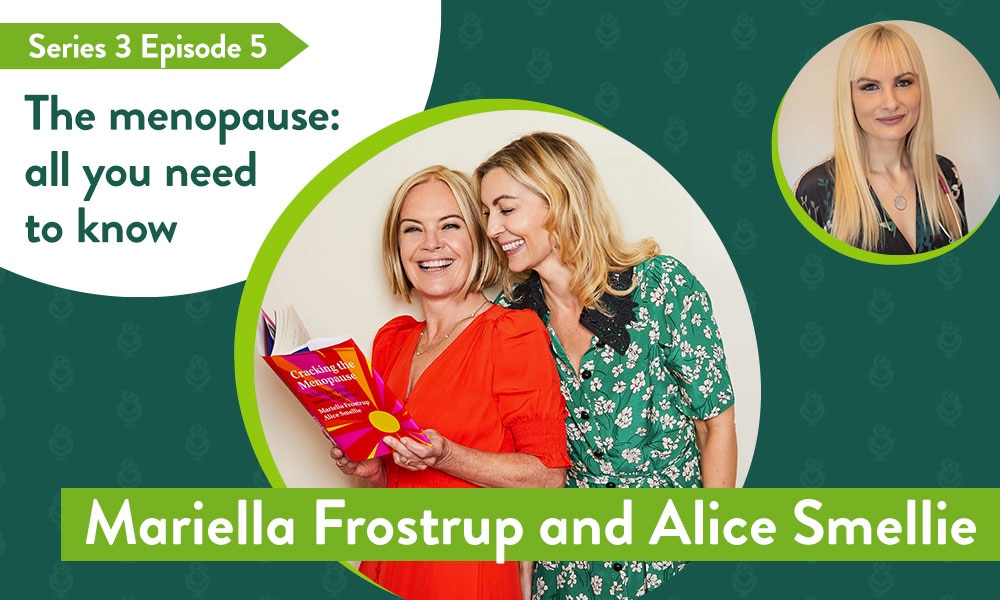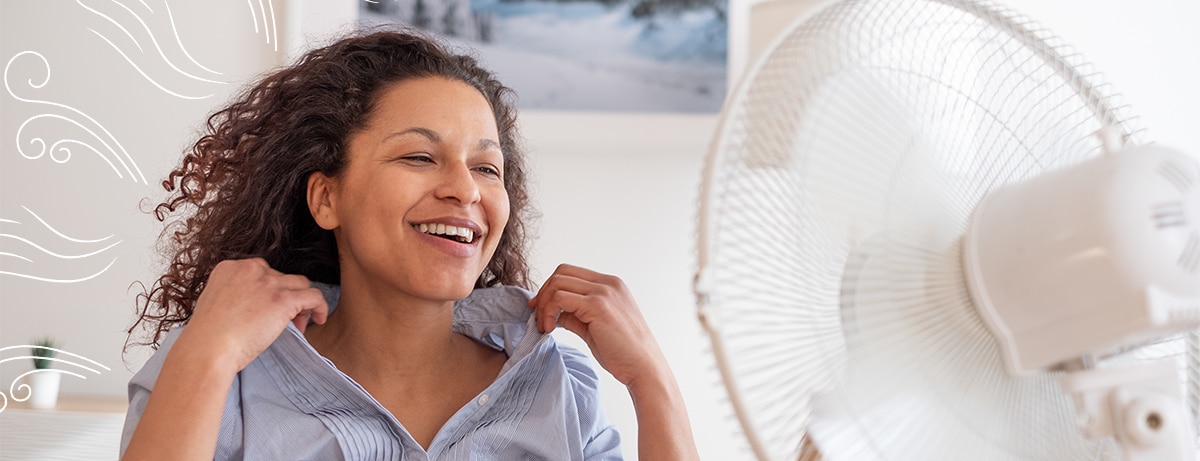Carousel main title
Main title
Menopause skincare: Supporting your skin

If you’re going through the menopause, you may have noticed some changes in your skin. So to help give it the right support, we’ve created a guide to looking after it during this time.
From key changes to the best ingredients to use, we’ve got the full low down in this article.
Skip to:
Arguably the main reason why menopause affects skin is due to the drop in oestrogen levels.1 This then has a knock-on effect on other areas of your health, which ultimately causes changes in your skin.
The drop in oestrogen in turn makes it harder for your body to produce collagen, which is what makes your skin stretchy, smooth and strong.
6 key menopause skin changes
There are a number of skin changes you may experience during menopause...
So to help you identify if they’re caused by menopause, we’ve listed some of the most common ones below:
-
Age spots
If you’ve spent a fair amount of time out in the sun, it’s likely that you may have some age spots (or sun spots). Not sure what to look out for?
Sun spots appear as flat, brown marks that can show up on your face, décolletage and arms.2,3
-
Dry skin
You may also have dry skin during menopause. This is because your skin can hold less water as you age (thanks to a reduction in oestrogen), leaving you with dryer skin than before.4
This can also be combined with itchy skin and it may appear slightly scaly too.5
-
Facial hair
Something else you may notice if you’re menopausal is an increase in facial hair. The shift in ratio of oestrogen to testosterone can cause wiry hairs to grow on your upper lip, chin, jawline and cheeks.6
Handpicked article: Your Ultimate Guide To Hair Removal
-
Slack skin
Slack skin, wrinkles and jowls may also become more prominent during menopause – and this is likely down to the drop in collagen.
In fact, experts believe that women lose up to 30% of the collagen in their skin within the first five years of menopause and then it becomes more gradual.7
-
Spots
You may feel like you’re reliving your teenage years during menopause, as you might have more acne flare-ups than usual.
This is usually a result of changes in the pH level of the skin combined with the fluctuations in hormones, which in turn can exacerbate breakouts.8
-
Slow wound healing
And the last change you may start to notice is that your wounds take longer to heal. Again, a significant shift in your hormone levels is to blame for this.9
Best skincare for menopausal skin
Wondering what sorts of skincare ingredients to look out for? We’ve got you covered.
Discover our skincare recommendations for people during menopause below:
-
Avoid soap
If your skin is itchy and dry it might be worth giving soap a miss. This is because they can sometimes strip your natural oils and grease from your skin.10
Instead, opt for creamy or hydrating cleansers that are less harsh on your skin.
-
Moisturiser is your friend
Moisturising your skin twice a day is a good bet if you’re going through the menopause – and we don’t just mean the skin on your face.
Moisturise in the morning after cleansing, toning and misting and again right before bed. Also, try to use a lightweight option for daytime and something a little more heavy duty in the evening.11
-
Try salicylic acid
If you’re trying to ease your menopause spots, another great ingredient to try is salicylic acid.
This works by getting into the hair follicle and oil gland then dissolving the dead skin cells, oil and other debris that cause spots.12
-
Introduce retinol into your routine
If you’re interested in skincare, you’ve probably heard of retinol. A type of vitamin A, retinol works by interacting with an enzyme which creates something called transretinoic acid.
This in turn binds roughly 52-57 types of DNA that help to repair skin and stimulate collagen production.13
-
Niacinamide
If you’re prone to menopause pimples, another ingredient that may work well for you is niacinamide. This works by reducing the swelling and redness that accompany spots.
But it also is supposed to help regulate the amount of oil in the skin which can cause pimples, as well as helping to even skin tone.14
Top tips for looking after your menopausal skin
1
Avoid hot showers
To help keep your skin at its best, try to stick to warm showers rather than hot showers and baths.
This is because the high temperatures can further strip your skin of moisture – and it may also help to keep unwanted hot flushes at bay.
2
Stay hydrated
We all know that drinking lots of water can benefit our skin, right?
Well, it’s no different during menopause. In fact, it may even be more important as your skin retains less moisture when you’re menopausal.
3
Consider taking supplements
If you feel like your skin needs a little extra assistance, it might be time to consider taking some supplements.
For example, if you’re experiencing dry skin because of menopause, choose supplements that are supposed to help with that. Potential menopause dry skin supplements include:
- Vitamin D15
- Collagen for menopause16
- Probiotics17
- Hyaluronic acid18
- Vitamin E19
- Omega-320
4
Pay attention to your diet
As well as taking supplements, ensuring you’re eating good quality food with lots of nutrients is just as (if not more) important. Check out our article on the best and worst foods for menopause for further help.
The final say
We hope you’re feeling a bit more informed on how to support your skin changes during the menopause.
But for more advice that is tailored directly to you, book an appointment with one of our expert advisors online today.
Why we ALL need to know more about the menopause
In this episode the conversation gets feisty as Mariella and Alice express their frustration at the general lack of knowledge about the menopause. Their discussion with Dr Gemma Newman includes:
- The general lack of knowledge about menopause.
- Understanding perimenopause and menopause and alleviating symptoms.
- How the menopause is the start of an exciting new life stage.


Last updated: 28 June 2022
- https://patient.info/news-and-features/how-to-manage-skin-problems-at-menopause
- https://www.aad.org/public/everyday-care/skin-care-secrets/anti-aging/skin-care-during-menopause
- https://balance-menopause.com/uploads/2021/09/Skin-changes-during-menopause-1.pdf
- https://balance-menopause.com/uploads/2021/09/Skin-changes-during-menopause-1.pdf
- https://balance-menopause.com/uploads/2021/09/Skin-changes-during-menopause-1.pdf
- https://www.aad.org/public/everyday-care/skin-care-secrets/anti-aging/skin-care-during-menopause
- https://patient.info/news-and-features/how-to-manage-skin-problems-at-menopause
- https://www.aad.org/public/everyday-care/skin-care-secrets/anti-aging/skin-care-during-menopause
- https://balance-menopause.com/uploads/2021/09/Skin-changes-during-menopause-1.pdf
- https://balance-menopause.com/uploads/2021/09/Skin-changes-during-menopause-1.pdf
- https://www.acnesupport.org.uk/treatment/salixylic-acid/
- https://aylabeauty.com/blogs/article/skin-changes-during-menopause-a-top-dermatologists-guide
- https://www.acnesupport.org.uk/treatment/niacinamid/
- https://www.ncbi.nlm.nih.gov/books/NBK532266/
- https://www.ncbi.nlm.nih.gov/pubmed/30681787
- https://www.ncbi.nlm.nih.gov/pubmed/25179904
- https://www.ncbi.nlm.nih.gov/pmc/articles/PMC5871318/
- https://pubmed.ncbi.nlm.nih.gov/9706379/
- https://www.ncbi.nlm.nih.gov/pubmed/22123240










